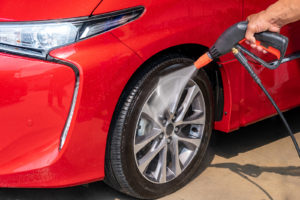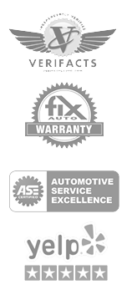How to Clean Your Car Wheels: Follow These 9 Steps
July 1st, 2020 by Fix Auto USA

Your wheels are probably the dirtiest part of your car, yet, if you are like most people, you spend considerably less time washing your wheels than the rest of your vehicle. Owners who neglect their wheels may not realize the toll it takes on their car. We hope that after reading this post, you are inspired to give your wheels a little more TLC.
Learning the best way to clean wheels is important, for both practical and aesthetic reasons. If you want your car to drive reliably, you have to get rid of the dirt and gravel attached to your wheels when they spin. Over time the dirt and grime accumulate, impacting your wheels’ ability to function, and accelerating the rate at which they deteriorate. What’s more, every time you put on the brakes, hot brake dust is produced and sticks to the surface of your wheels.
Dirty wheels also affect the appearance of your car. When they spin, all that dirt and grime gets sprayed onto the body of your vehicle. All that work you did to wax and polish your car goes down the drain. Even more important, when brake dust is ignored, it solidifies and can cause permanent damage to your wheels.
How to clean car wheels
Neglected tires can develop an unattractive brownish tint and sidewall cracking, so we are going to show you the best way to clean wheels, how to polish car wheels, and how to wax car wheels. Before jumping in, here are the car wheel cleaning products and materials you will need: a wheel cleaner, a wheel polish, a wheel detailing clay, plenty of non-abrasive towels, a soft-bristled brush, and a couple buckets of water.
The best way to clean wheels is to follow these nine steps in sequential order:
Step 1: Have two buckets of water ready to go, one for the car’s body and one for the wheels.
You want to avoid using the same bucket of water that you use on the body of the car for your wheels.
Step 2: Hose your wheels down one rim at a time.
Make sure to use a hose that has a powerful stream!
After hosing down the rims, use a cloth to remove any dirt, grime, and brake dust from each rim.
Step 3: Apply the cleaner
Spray one wheel at a time. Protect your wheel’s finish by using a water-based, non-acidic, non-abrasive car wheel cleaning product.
This will help loosen the grime and lubricate the wheels, which is important so that you don’t scratch the alloy rims.
If possible, avoid using an acid-based cleaner as they carry the risk of damaging your wheels, especially if they’re clear-coated.
Step 4: Use a soft-bristled brush
A regular sponge is not up to the challenge of scraping off all the grime and dirt accumulated on your wheels. Also, if you use a hard-bristled brush, you risk scratching your rims.
Use a soft-bristled brush to scrub and loosen any remaining grime and brake dust. Use some elbow grease but be careful not to scratch the wheel finish. Use a brush that is long enough to reach into the crevices and clean around the lug nuts and inside the holes, spokes, and wheel well.
When you purchase car wheel cleaning products, look for a brush with a flexible stem and a lug nut brush specially designed for this job.
Step 5: Rinse
Hose down each wheel, including the wheel wells, spokes, and lug nut holes.
Step 6: Dry
Use a soft, micro-fiber towel to dry the wheels and prevent water spots.
Step 7: Apply wheel detailing clay
If grime, corrosion, or brake dust remains, apply detailing clay to help remove substances that remain deeply embedded in the wheel.
This is a different product from the detailing clay that you use to protect your car paint. Apply wheel detailing clay after cleaning the wheel but before polishing or waxing. Make sure to re-lubricate the wheel before rubbing the clay over it.
Step 8: Polish your car wheels
Polish should be applied prior to waxing your wheels. If you want to know how to polish car wheels, the first thing to remember is that your rim’s finish will dictate the type of polish to use.
Most wheels these days are made of aluminum alloy, and most cars come equipped with clear coated alloy wheels. But if you or a former owner of the car got aftermarket polished wheels, that means they have a coat over them and need to be treated with extra care.
With clear coated aluminum wheels, you will want a light, non-abrasive polish that is less likely to leave scratch marks.
Clear coated wheels do not require frequent polishing, because the extra coating protects the metal from environmental elements. You don’t have to do much more than regular cleaning and occasional polishing to maintain your clear coated wheels in near-pristine condition.
Since they lack that extra coat, aluminum wheels are more prone to oxidation. A stronger and more aggressive polish can be used on them.
For chrome wheels, use a lightly abrasive polish.
Key Steps
Start by using an applicator pad to spread the polish onto one wheel at a time, until the polish starts to dry.
Make sure to polish between the spokes. If more precision and power are required, consider purchasing a wheel polishing tool and other car wheel cleaning products.
Use a clean, soft towel to wipe away any remaining residue or moisture.
Step 9: Finish off with a wax
Now that you know how to clean car wheels and how to polish car wheels, it’s time to wax your rims to give them a nice luster and a final layer of protection from brake dust and environmental elements. Wheel wax is a protectant that works like regular car wax. Again, if you have coated or painted wheels, choose a safe and compatible product for that type of wheel.
Pitfalls to avoid
1) Forgetting micro-fiber cloths
When cleaning your wheels, common mistakes include letting the sun dry the wheels – hello watermarks – or using paper towels. There’s no substitute for a soft microfiber cloth or pad. Anything else risks scratching the surface.
2) Not reading the labels
If you are a do-it-yourselfer and it’s been a long time since you bought car wheel cleaning products like wheel cleaner, car wax, and car polish, please, make sure you read the label and verify that it is compatible and safe to use with your kind of wheels, whether they are clear coated or powder coated, roughcast aluminum, or chrome.
When it comes to car wheel cleaning products, there’s no one-size-fits-all approach. Each product is customized for a special kind of wheel. Some cleaners contain powerful chemicals, while others are natural and chemical-free; some are abrasive or lightly abrasive, while others are soft and gentle. An acidic cleaner might do a great job of removing brake dust, but if you have clear coat wheels, avoid using it at all cost.
3) Don’t use a soap solution to clean your wheels
No doubt it’s very tempting to want to be efficient and use the same soapy water that you used on the exterior of your car on your wheels. But it is simply not up to the task; cleaning your grimy, brake dust-infested wheels requires a much stronger cleaning agent than soapy water. Buy yourself a real wheel cleaner and let it perform its magic.
4) Washing your wheels last
The best way to clean wheels is to start by hosing down your tires and wheels first, one at a time, not all four at once. This will help you avoid corrosion and ensure that you don’t get all that wheel dirt over your car’s body after you’ve polished and waxed it.
Cleaning one wheel at a time is important to prevent the water, soap, and chemicals from drying before you get to the other wheels. Don’t rush – take your time!
5) Save your toothbrush for the bathroom
A lot of sites recommend using an old toothbrush to scrub the grime off of your wheels. Guys, that just doesn’t end well. The bristles of a toothbrush are too short and stiff, which risks scratching the wheel. Either use a soft-bristled brush or better yet, invest in a wheel brush with a long stem, so you can clean the spokes and lug nuts and reach down into the wheel well.
Car wheel cleaning products
There is a multitude of car wheel cleaning products on the market, ranging from natural and synthetic waxes and polishes, to wheel brushes, wax applicators, hand polish, and microfiber application pads.
So what car wheel cleaning products should you use? In truth, the cleaning product you choose is less important than learning how to wash your wheel effectively and in a manner that won’t damage your wheels’ finish.
Make sure any products you use are safe and compatible with the kind of wheels that you have. You might get away with using a more abrasive polish with a regular aluminum wheel, but if you have a clear-coated wheel, you will need a gentle product that doesn’t scratch it. Clear coated wheels should be cleaned with a water-based, non-abrasive wheel cleaner. And likewise, metal polish should not be used on metal wheels that have a clear coat.
What kind of car wheel cleaning products should you use for scrubbing? For starters, refrain from using any items, such as a steel wool pad or dish scrubber, that might scratch your wheels. You probably have a soft-bristled brush around the house, but if not, consider investing in a wheel brush. In addition, a soft microfiber cloth or application pad is a must-have if you’re going to be a do-it-yourself detailer.
Always make sure to read the product’s instructions first, as well as your vehicle owner’s manual, and you are good to go.
This blog post was contributed by Fix Auto Corona a leading industry expert and collision repair shop servicing customers in Corona city and Riverside County, California.
Welcome to
Fix Auto USA
We are the premier independent body shop network delivering world-class customer service and high-quality collision repairs across the U.S.
Learn About Us





